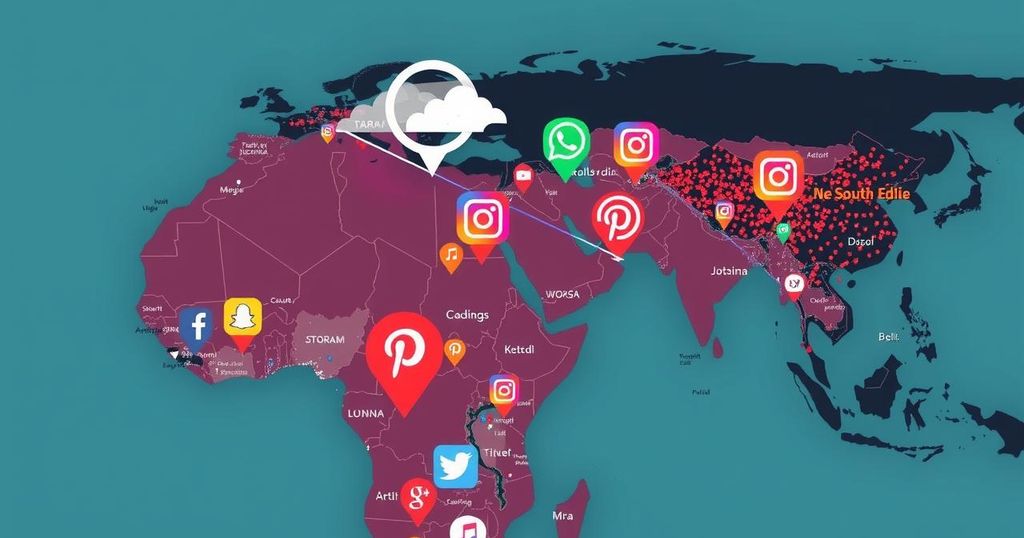The Role of Social Media in South Sudan’s Political Turmoil

The article discusses the negative impact of social media on South Sudan’s political climate, emphasizing that misinformation complicates the peace process. It highlights a recent incident involving the Minister of Cabinet Affairs and Radio Tamazuj, illustrating how false narratives can exacerbate tensions. The author advocates for responsible media practices and communication among political figures to promote peace in the region.
Social media has significantly contributed to the political turmoil in South Sudan, necessitating that individuals refrain from spreading disinformation to foster a peaceful environment. The ongoing discourse among South Sudanese with varying political opinions highlights how such confusion fuels violence across society. A recent exchange between Radio Tamazuj and Minister of Cabinet Affairs, Martin Lomuro, illustrates the detrimental influence of social media during this troubling time in South Sudan’s political landscape.
Following the commencement of the Tumaini peace negotiations in Nairobi, misleading allegations circulated online, claiming that the lead mediator had expelled Minister Lomuro due to his negative stance on involving factions that did not endorse the 2018 peace accord. These unfounded rumors, despite lacking any basis, prompted a response from the minister during a press conference, showcasing the tense relationship between governmental authority and independent media.
Martin Lomuro accused Radio Tamazuj and opposition factions of spreading fabricated reports about his expulsion. However, he did not confirm whether he had directly heard such allegations from the outlet itself. This incident underscores the poor rapport between the media and public officials, the misuse of social media for malicious purposes, and the potential harm to the relationship between political leaders and the media in South Sudan.
While some may perceive this situation as trivial, the significance escalates when considering the sensitive political climate in the nation. Elements opposed to the peace process are leveraging these confusions to destabilize progress. The pervasive misinformation historically tied to social media has had dire ramifications, including the loss of life during the ongoing conflict.
The fallout from the July 2016 peace accord collapse serves as a stark reminder of the dangers stemming from misinformation. Conflicting narratives regarding the causes of violence that erupted in Juba subsequently left a resurgence of conflict, illustrating how social media can be exploited to incite chaos. Misleading claims concerning the detention of political leaders ignited tensions, leading to unwarranted violence, further hampering peace efforts.
The recent clash between Radio Tamazuj and Minister Lomuro could jeopardize the current negotiations in Nairobi. It is imperative that those involved in peace talks focus on constructive dialogue and disregard fabrications circulating on social media. Enabling the negotiating teams to pursue amicable resolutions is essential for establishing peace in the region.
As a community organizer and Ph.D. candidate focused on peacebuilding within South Sudanese society, the author advocates for responsible communication to protect the prospect of peace.
In South Sudan, social media has emerged as a significant platform for both communication and misinformation. The country’s political climate is fraught with tensions stemming from historical conflicts and ongoing efforts to establish peace. The interplay between government actions and media narratives often exacerbates these tensions, leading to widespread confusion and unrest. Given South Sudan’s fragile peace process, any incident that fuels public discord can have disastrous repercussions, necessitating a careful examination of how information is shared and consumed in the digital age.
In conclusion, the misuse of social media in South Sudan presents a formidable challenge to the peace process. The recent incident involving Minister Lomuro and Radio Tamazuj illustrates the potential dangers of misinformation, highlighting the need for responsible communication and cooperation among political leaders and media outlets. To promote stability, it is essential for all stakeholders to prioritize peace and adhere to accurate reporting. The lessons from past conflicts underscore the urgency of addressing the detrimental impact of social media on the socio-political landscape of South Sudan.
Original Source: www.radiotamazuj.org








